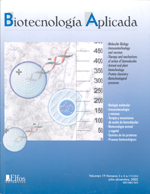
|
Biotecnologia Aplicada
Elfos Scientiae
ISSN: 0684-4551
Vol. 17, No. 4, 2000, pp. 241-246
|
 Bioline Code: ba00073
Bioline Code: ba00073
Full paper language: Spanish
Document type: Research Article
Document available free of charge
|
|
|
Biotecnologia Aplicada, Vol. 17, No. 4, 2000, pp. 241-246
| en |
Study of the Variability Induced in In Vitro Cells and Regenerated Plants of Onion ( Allium cepa  L.) cv. Caribe-71. L.) cv. Caribe-71.
Rodríguez, Amelia Capote; Mayor, Zoila Fundora & Díaz, Odalys Pérez
Abstract
The effect of different growth regulators on callus induction and growth from segments of young leaves, was studied. Plant regeneration from these calli was also studied. Variations that might be present during the in vitro culture period were evaluated by means of cytogenetic and biochemical (peroxidase patterns) studies. The results showed that callus cells have different ploidy levels depending on the type and concentration of the regulators added. Plants regenerated from calli showed differences in their morphological traits but kept their diploid condition, which evidenced the existence of a selection process during cell differentiation. Peroxidase patterns showed variations in the calli and the regenerated plants in relation to the original material. We suggest the use of these results in research works concerning the application of biotechnological techniques to obtain a new genetic variability, as well as the continuation of these studies using other molecular techniques that enable us to gain insights into the genome of these plants.
Keywords
Allium cepa, genetic instability, onion, somaclonal variation
|
| |
| es |
Estudio de la Variabilidad Inducida en Células y Plántulas de Cebolla ( Allium cepa  L.) cv. Caribe-71 Regeneradas In Vitro L.) cv. Caribe-71 Regeneradas In Vitro
Rodríguez, Amelia Capote; Mayor, Zoila Fundora & Díaz, Odalys Pérez
Resumen
Se estudió el efecto de diferentes reguladores del crecimiento sobre la inducción y crecimiento de callos a partir de segmentos de hojas inmaduras, y la regeneración de plantas a partir de éstos. También se evaluaron, mediante estudios citogenéticos y bioquímicos (isoenzimas peroxidasas), las posibles variaciones que se pudieran presentar durante el período de cultivo in vitro. Los resultados obtenidos muestran que, en las células presentes en los callos, se observan diferentes niveles de ploidía en dependencia del tipo y concentración de los reguladores adicionados. Las plantas regeneradas a partir de callos muestran diferencias en algunos caracteres morfológicos relacionados con los rendimientos, pero mantienen su condición diploide, lo que evidencia la existencia de un proceso de selección en la diferenciación celular. Los patrones isoenzimáticos muestran variaciones en los callos y las plántulas regeneradas en relación con el material original. Se sugiere utilizar estos resultados en investigaciones encaminadas a la aplicación de las técnicas biotecnológicas a la selección de una nueva variabilidad genética, y profundizar en estos estudios mediante el empleo de otras técnicas moleculares que permitan hacer un análisis más detallado del genoma de estas plantas.
Palabras-clave
Allium cepa, cebolla, inestabilidad genética, variación somaclonal
|
| |
© Copyright Elfos Scientiae 2000
Alternative site location: http://elfosscientiae.cigb.edu.cu/Archivo.asp?Id=6
|
|
